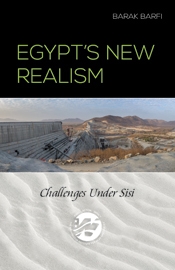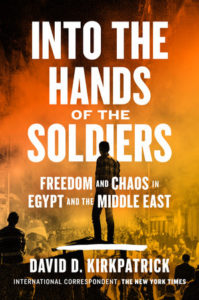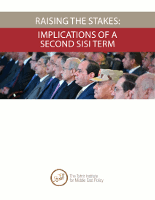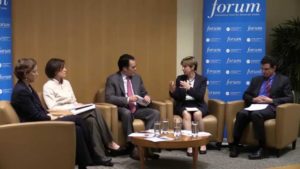 Anecdotally, Egyptians appear far more concerned about security and economic issues than they are about their diminished civil liberties, argues Barak Barfi, a research fellow at the New America Foundation. Indeed, polls indicate that Egyptians view democratization as a tertiary concern after economic and political stability, if a concern at all. In light of such findings, a return to democracy is not a priority for the vast majority of Egyptians.
Anecdotally, Egyptians appear far more concerned about security and economic issues than they are about their diminished civil liberties, argues Barak Barfi, a research fellow at the New America Foundation. Indeed, polls indicate that Egyptians view democratization as a tertiary concern after economic and political stability, if a concern at all. In light of such findings, a return to democracy is not a priority for the vast majority of Egyptians.
At the same time, Washington should not give up on a democratic opening. It should quietly impress upon President Abdul Fattah al-Sisi the need to respect the Egyptian Constitution, which went into effect in early 2014, and step down after his term ends, he writes in Egypt’s New Realism: Challenges Under Sisi, a report for the Washington Institute for Near East Policy:
But it should be wary of pressing too hard to restore democracy. To be sure, the United States failed to make the most of Egypt’s evanescent democratic opening. Instead of working with liberal leaders to ensure a long-term smooth transition from the Mubarak era, the administration acquiesced to immediate elections, for which only organized Islamists were ready. If the United States coerces Egypt to restore democracy, the country’s leaders will turn to other nations unconcerned with its form of government.
Indeed, Cairo is turning away to autocratic states for investment and diplomatic support……
 Egypt started drawing closer to Russia and China to diversify its foreign relations and find allies other than its traditional partners in the US and Europe, who signaled unease about a popularly-backed coup followed by a crackdown on dissent, The Financial Times reports:
Egypt started drawing closer to Russia and China to diversify its foreign relations and find allies other than its traditional partners in the US and Europe, who signaled unease about a popularly-backed coup followed by a crackdown on dissent, The Financial Times reports:
Cairo values China’s stated policy of non-interference in other countries’ affairs and is keen to attract Chinese investors to the big infrastructure projects that are a major part of Mr Sisi’s economic policy. “There are economic powers who have the ability to help us but not the desire, and others who have the desire but not the ability,” said Mostafa Ibrahim, deputy head of the China committee in the Egyptian Businessmen’s Association. “China tops the list of those who have both the ability and the desire.”
 Though Sisi does not face organized opposition, he must nevertheless contend with numerous challenges that could threaten his popular support, Barfi adds:
Though Sisi does not face organized opposition, he must nevertheless contend with numerous challenges that could threaten his popular support, Barfi adds:
Separately, each of these matters is unlikely to topple him, but failure to deal effectively with them on the collective level could force Sisi to increasingly rely on coercive elements of power. Heretofore, these kinds of tactics have largely been reserved for civil society activists, journalists, and the political opposition. Given that the 2011 revolution lifted the civilian curtain of fear while shattering the myth of the security services’ invincibility, this dynamic should give the government cause for concern. RTWT
Notwithstanding this growing freedom deficit, Washington has sought to maintain good relations with Cairo, including through the release of $195 million in frozen military funding, WINEP adds. Going forward, how should the Trump administration balance these competing interests in its complex relationship with Cairo? And what do Egyptians actually want from the United States?
 To discuss these questions, The Washington Institute is pleased to host a Policy Forum with Barak Barfi and Michele Dunne (2nd from right).
To discuss these questions, The Washington Institute is pleased to host a Policy Forum with Barak Barfi and Michele Dunne (2nd from right).
EGYPT AND WASHINGTON: CHALLENGES IN THE SISI ERA.
WEDNESDAY, OCTOBER 31, 2018
12:00 PM to 2:00 PM
Barak Barfi is a research fellow at the New America Foundation and author of the recent Washington Institute study Egypt’s New Realism: Challenges Under Sisi.
Michele Dunne [a board member of the National Endowment for Democracy] directs the Middle East Program at the Carnegie Endowment for International Peace. Her long record of government service includes stints at the U.S. embassy in Cairo, the National Security Council, and the State Department Bureau of Intelligence and Research.
This event will be held at The Washington Institute, 1111 19th Street NW, Suite 500, Washington, DC, 20036. It will also be broadcast live on the WINEP website.







